 Think Inside the Box
Think Inside the Box
When Brooklyn Brewery’s trailblazing brewmaster Garrett Oliver finished editing the Oxford Companion to Beer he decided to craft an ale with just as much gravitas. Called The Companion, it’s special—an old style known as “wheat wine.” The catch is the 750-ML bottle is only sold with the book as part of the $80 Brooklyn Box Set. The hard part? Deciding which to give and which to keep for yourself.
 Bottle Bible
Bottle Bible
Brewed Awakening—the new book chronicling America’s growing craft beer movement—was penned by Joshua Bernstein, a Brooklynite, beer brainiac and occasional EB contributor. It’s worth its $25 cover price not just for the easy-to-read demystification of how and why great beers are made, but for the extra Bernstein brainstormed: a map of hard-to-find brews hidden within the inside flap.

Ring in the Resolutions
Most Champagne is made from conventional grapes and lab yeast, but Jenny & Francois Natural Wines imports a better bubbly. Jacques Lassaigne uses only grapes from his own vineyard (think farmstead cheese) and indigenous yeast. The result? Beautiful limestone minerality, plus you’ll start 2012 without the sulfite hangover. Poured at many Michelin-starred restaurants, and available at Uva Wines, Heights Chateau, Blanc & Rouge, and Thirst, $54.
 DIY Drinking
DIY Drinking
Turned off by the powders and packets most homebrews use? Then the Brooklyn Brew Shop’s new book is for you. Its 52 straightforward recipes feature fresh ingredients, often available at the Greenmarket, plus they’re presented in a one-gallon stove-top style that’s perfect for city kitchens. Buy a copy for the locavore lush on your list, or keep it and make her bespoke bottles of Maple Porter. $19.99.
 Sustainable Stocking Stuffer
Sustainable Stocking Stuffer
Here at Edible Brooklyn, M. F. K. Fisher is something of a patron saint, so imagine my delight to learn that a Cobble Hill-based writer has just published a modern-day answer to Fisher’s culinary classic, How to Cook a Wolf. That 1942 essay collection is more than just a roadmap to real meals in an era of wartime rationing, it’s also some of the finest food writing in history. Now Tamar Adler, who worked as an editor at Harper’s Magazine and a chef at Chez Panisse, has used it as muse for her beautiful new book. An Everlasting Meal: Cooking with Economy and Grace is simultaneously more practical and more poetic than any food writing in recent memory, and while its 20 gorgeous essays contain only a sprinkling of recipes, it’s already changed the way I salt eggs, core cauliflower, even boil water. Adler quotes Thackeray and Rilke, but the real genius is in simple lines like this one about beets: “If you’re not sure if they’re done, they’re not.” $25



